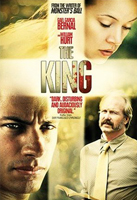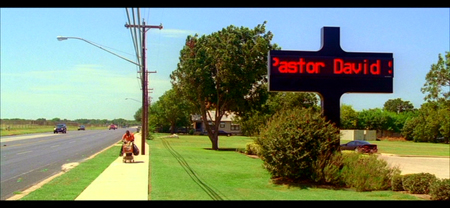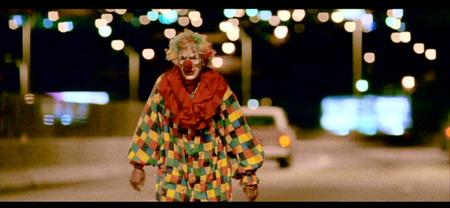 BUY IT AT AMAZON: CLICK HERE!
BUY IT AT AMAZON: CLICK HERE!
STUDIO: ThinkFilm
MSRP: $27.98
RATING: R
RUNNING TIME: 103 minutes
SPECIAL FEATURES:
• Commentary w/ writer/director James Marsh and writer/producer Milo Addica
• Deleted scenes
• Rehearsal sequence
• Trailers
The Pitch
"It’s Absalom! Absalom! meets The Good Son!"
The Humans
Gael Garcia Bernal, William Hurt, Laura Harring, Paul Dano, Pell James.
The Nutshell
You know the parable from the Bible about the prodigal son? The dude that swore off his father’s name, took his inheritance, and ended up sleeping in pig sties? Then he came home, his dad gave him a big hug and a huge feast, and everything was great. Imagine that, only instead of an inheritance the son got a swift kick in the ass, and instead of welcoming him home the father tries to convince everyone that this isn’t his son, that’s ridiculous, how could I possibly have had a son out of wedlock?

"…free with each set of snow tires!"
The Lowdown
The King‘s co-writer and director, James Marsh, also co-wrote the Billy Bob Thornton/Halle Berry stoicism fest Monster’s Ball, which is important because you can draw a lot of parallels between the two. Both are set in lonely, rural landscapes; both deal with quiet secrets that destroy lives; both are sluggish parades of pain.
The content is different enough, though, to set The King apart as its own animal. The script’s major concern is with the hypocrisy of Christianity; not with a redundant exposition of such, but with an examination of particular ways it breaks the spirits of its subscribers. The deconstruction of that sad sin gets somewhat complicated, and the film is all the better for it. One of the touchstones of a hypocrite is a desperation to preserve his or her beliefs without pesky reason interfering. This manifests in William Hurt’s portrayal of the unnamed father, whose strict household allows for no question or challenges from his two legitimate children.

Connect the dots! La la la la!
But one of the most important parts of growing up for any child is the gradual shift from what the parent believes to whatever makes the most sense to a child. Someone who has never come to his own understanding about religion, politics, and the other big topics can’t really be considered to have grown up. Enter Elvis (Bernal), Hurt’s illegitimate son. He never had the chance to be indoctrinated by his father, which puts him immediately at odds with the other two children. Together, the three of them just about make up one whole character: Elvis is the spirit of independence, Paul (Dano) embodies that bittersweet moment when a kid realizes his parents aren’t always right, and Malerie (Pell James) stands as the rebellion that occurs sometime between the state of Paul and the state of Elvis.
Instead of a journey for one character, then, The King is a bit of fantasy predicated on the question: What if I could meet myself at these different stages in life? It’s a thoughtful comment on the tensions that exist within a child raised in a faith-based household. It’s a high-concept given ground-level treatment which appeals to me for personal reasons, but is possibly insular enough not to resonate with a wide audience.

They call William Hurt the father of modern sniping. His body is photosynthetic. Snake? Snaaaaaaake!
If it doesn’t, there’s another, more literary angle with which to view the plot. Several times during the film the characters bring up the (heh) debate between Darwinian natural selection and intelligent design. Intentionally or not, the interaction between the three children follows a simplified model of that natural selection. The strongest will survive. Like beasts, they move against one another, subtly and plainly. This facet of the plot proceeds so rigidly in order with nature that it’s no surprise whatsoever that it’s Elvis who comes out the victor.
His mode of doing so occupies the majority of the running time. When he finds his homecoming obstructed by Hurt’s unwillingness to accept a son from his life before he became a Christian, Elvis begins to look for other ways to insinuate himself. The road he chooses will repel some, and just confuse others. He decides he has a thing for his half-sister, and starts to, uh, "woo" her. He doesn’t tell her that he is her brother, of course, because why would you want to ruin a good thing. Hurt and Elvis hang on to the same secret, but for different reasons: Elvis wants to maintain his relationship with his sister, and Hurt doesn’t want to admit to having lived in sin.

"Oh god… I’m a metaphor, aren’t I? A goddamn visual metaphor!"
The film uses that secret as its source of power, building up momentum to the revelation. But the way it goes about it isn’t entirely coherent. The whole script has a general feeling of having missed out on at least one good revision. Well-rounded characters are those who can perform unexpected actions convincingly; flat characters just perform unexpected actions, with no apparent motivation. The whole script is built like a flat character. Perhaps details of motivation were concealed in order to make the occasional bursts of violence more shocking — but if they are more shocking then they carry less impact of the narrative kind.
If the audience can accept the roughness of structure, the complicated set of revelations that bring all the truths to light does an adequate job of releasing the tension. It is in the final minutes, however, that the worst of the unconvincing, unexpected actions take place, and the final shots are the least moving in the whole of the thing, though they are plainly intended to be the most.
The King is a relentless drumbeat of misery, textureless and lacking most of the necessary motivations. For a story with such a rich concept, it’s unfortunate that the final product is monotonous by definition.

By "girl" they mean "whore." I’m sure it’s his wife. I’m sure it is.
The Package
Before I address the bonuses, I’ve got to say that the disc I received, which appears to be a production copy, is absolutely filled with compression artifacts. Whenever text appears on screen, and even between sharply divided colors, there is a thin haze of distracting noise.
The bonuses include a commentary with the two writers, Milo Addica and James Marsh, who also happen to be the producer and director, respectively. Both men have high expectations for the profundity of their film, and spend a little too much time tacitly congratulating one another on their accomplishment. Apart from that, there are some great anecdotes about working with William Hurt, and with Gael Garcia Bernal.
You also get some deleted scenes, a sequence from a cast rehearsal, and some trailers.
5.8 out of 10